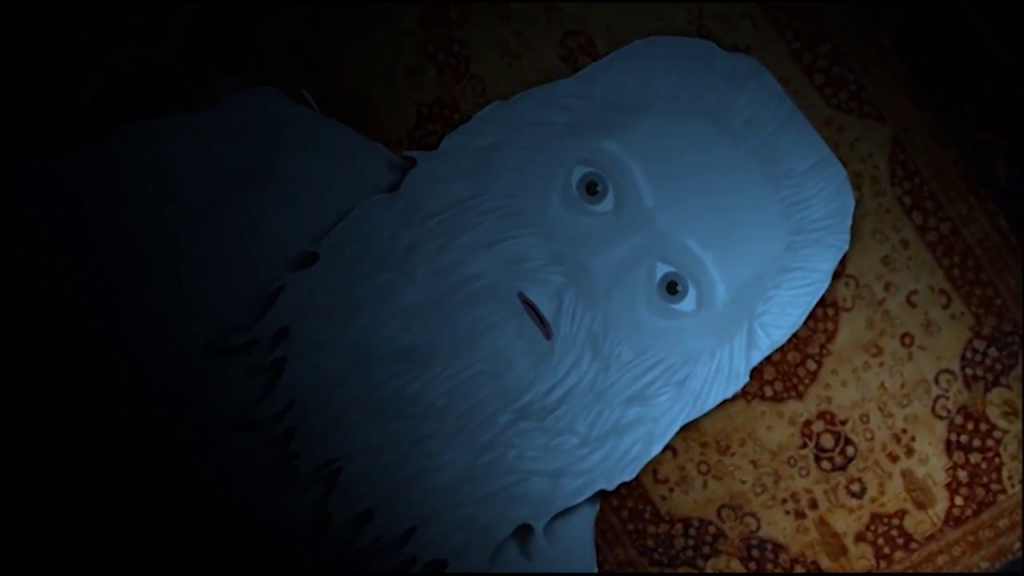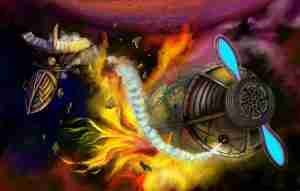
Chapter Title: On the Nature of Re-Genesis
The titles of each chapter are probably my favorite parts of the book. I can’t remember how they came to be, exactly, but they are meant to poke fun at philosophical treatises. Each one follows the format: On the (philosophical term) of (something relevant to the chapter). I’m not really sure what the nature of re-genesis is, but I do like the sound of it.
The first inside joke happens pretty much right away. I like to try and use numbers that are relevant in some way when I need a date. In chapter one, God is supposed to meet Freud in room 3 on October 11. The reason that the title of the chapter includes “Re-Genesis” is to direct you to Genesis 3:11. I know, it’s a stretch, but here is the passage for you, “And he said, ‘Who told you that you were naked? Have you eaten from the tree that I commanded you not to eat from?’”
Ooooo, Nietzsche is implying that God knows or did something that he wasn’t supposed to. Pretty intense, right?
Next, the description of Freud’s consulting room is my attempt to explain the mess that was really Freud’s consulting room. The following is the actual image that I used to try to develop the scene. I found it interesting that the details were hard to see and used that as the stepping point to the “garbled history” reference (but I am pretty sure that one of the background pictures are of Abu Simbel). Also, I am alluding to the role of Freudian psychiatry to uncover latent meaning.

I pictured Freud as having that standard voice that people associate with Freud. You know the one, “Vuld you like zum buttah?” Maybe it’s more like Himmler’s SS voice, I’m not sure. But that’s how I imagine Freud.
In each chapter, Freud offers God some drugs, then proceeds to get high. Freud did enjoy drugs. The extent to which he did drugs isn’t well documented, but many historians believed that his cocaine habit was pretty bad. Here’s an article about his use of cocaine.
In this first chapter, God introduces us to his co-workers (and his friend, Bacchus) and tells some story about each one. Each story that he tells is in some way related to an historical account of that God – sort of.
 | Bacchus – He was the Roman god of agriculture and wine. In the novel, wine is his specialty. God likes to party with Bacchus. It’s always a drunk-fest with him, a regular Bacchanalia. |
 | Jehovah – Jehovah is God’s out-bound calling twin. God doesn’t have much respect for Jehovah, which is meant to show the little respect that most people have for both marketing callers and Jehovah’s witnesses. And, in a sense, when a Witness comes to your door, they do become marketing callers. |
 | Buddha – My version of Buddha isn’t even the real Buddha. He is the popular misrepresentation of who Buddha was. The guy that I used, “Fat Buddha”, is Budai. Apparently if you rub his belly, he brings you good luck. Budai was a zen monk in China. There are stories of him going to the market and having a good time with people, helping them out. I’m sure he was a nice guy, but he wasn’t a Buddha. Furthermore, the fact that he smokes pot and just kind of hangs out pokes fun at how Buddhism was represented by hippies when Buddhist culture first hit the US in the late 60s. There is no real hint of Buddhism at Heaven Inc. |
 | Pan Gu – According to Chinese mythology, Pan Gu helped to create the universe as we know it. Here is a video about the myth. https://www.youtube.com/watch?v=LCaBs7EH79o |
 | Shiva – Shiva is a part of the Hindu Triumvirate. She is the destroyer, but that’s not necessarily a bad thing. In this article, she is portrayed as a he. You can decide for yourself if it’s a he or a she. Here is an article to help explain: http://www.bbc.co.uk/religion/religions/hinduism/deities/shiva.shtml |
 | Ishtar – She is one of my favorite sub-gods in the story. Ishtar has taken on many forms with many different names in history. I think it’s interesting how many things she has come to represent, as well. Fertility, mother, agriculture, patron goddess of bars, prostitutes, alcohol, and so on. She has been represented as anything and everything. In the novel, I only used to alcohol / prostitute references to her godliness. She’s as drunk as Janis Joplin and as loose as Rahab the Harlot. |
 | Osiris – His story is pretty amusing. The story as I tell it in the first chapter is condensed, but accurate to the legend. |
 | Janus – The last god that is mentioned in the call center is Janus. He isn’t very interesting in terms of what happens in the book, he’s just there to fill a spot, basically. I think he is only mentioned in chapter one then left alone. If you want to know more, here is a briefing on the god: https://www.youtube.com/watch?v=JhWVyLw3Wg4 |
And that rounds up the first chapter. It was a long chapter to write because there was so much research involved but it was a ton of fun to craft.
Buy it Now! Amazon Smashwords Barnes and Noble iBooks Kobo






